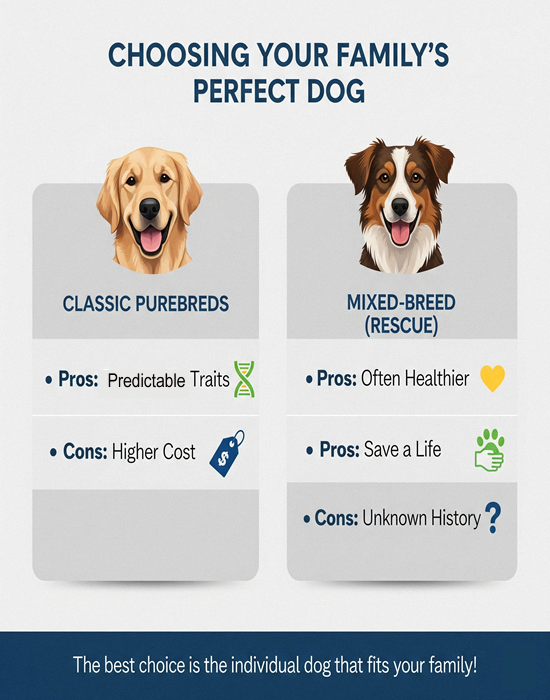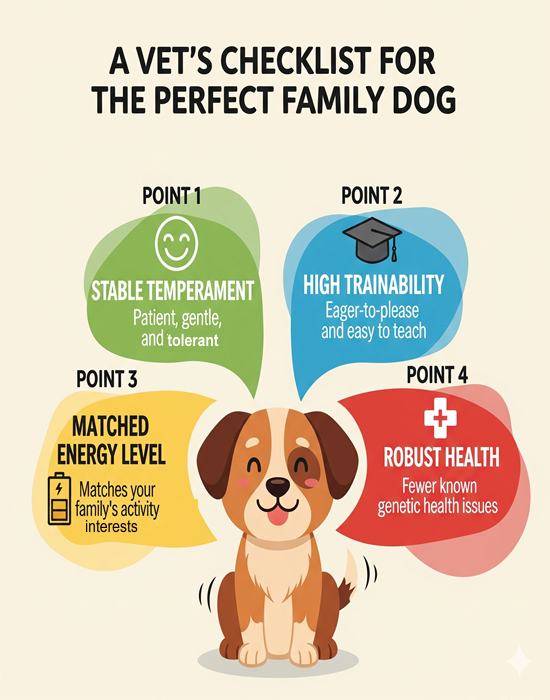The #1 Good Dog for Family, According to Vets (And Their Answer Will Surprise You)

The dream of adding a wagging tail and a warm, furry presence to the family home is a deeply cherished one for many. Images of children playing fetch in the yard, cozy evenings with a dog curled at your feet, and the unconditional love only a canine companion can provide often fuel this desire.
However, beneath the heartwarming vision lies a significant decision: which dog breed is truly the good dog for family life? The sheer volume of choices, coupled with well-meaning advice from friends, online forums, and glossy magazines, can quickly turn an exciting prospect into an overwhelming quest.
In this article, we delve deep into what truly constitutes a suitable family dog from an expert perspective and reveal the #1 recommendation that might just challenge everything you thought you knew about finding your next four-legged family member.
What Do Vets Mean by a “Good Dog for Family”?
Before we can crown a winner, it’s crucial to understand the criteria. When a veterinarian evaluates a dog’s suitability for a family environment, they look far beyond breed popularity or aesthetic appeal. Their assessment is rooted in a practical understanding of what creates a harmonious, safe, and lasting relationship between humans and animals. They prioritize a core set of traits that serve as the foundation for a successful family pet.
Firstly, temperament is paramount; a dog must possess a high degree of patience, a gentle nature, and a stable, predictable disposition. This ensures they can handle the unpredictable energy of children and the general chaos of a busy home without stress or aggression. Secondly, trainability is a key factor. An intelligent dog with an eagerness to please is not only easier to house-train and teach basic commands to, but this trait also indicates a willingness to integrate into the family’s structure and rules, making for a more manageable and enjoyable companion.
Thirdly, a dog’s energy level must be realistically matched to the family’s lifestyle. A mismatch here is a common source of problems, where a high-energy dog in a low-activity home can develop behavioral issues out of boredom and frustration. Finally, vets give significant weight to general health and longevity. A breed prone to a long list of genetic ailments can mean years of expensive vet bills and emotional heartache for a family, so a predisposition for robust health is a heavily favored attribute.
The Hall of Famers: Why the Classics Are Still Great Choices
There is a very good reason why certain breeds are consistently recommended for families. They have a proven track record of possessing the key traits vets look for, making them a reliable and wonderful choice for many households. The Labrador Retriever, which held the American Kennel Club’s (AKC) #1 spot for popularity for an incredible 31 years, is the quintessential family dog. Their enthusiastic, friendly nature and high trainability make them game for any family adventure.
Similarly, the Golden Retriever is renowned for its saint-like patience and gentle demeanor, making it an exceptionally trustworthy companion for even the youngest children. For families who enjoy a more rambunctious and scent-driven adventure, the Beagle offers a merry and compact option. Their sociable nature, honed from their history as pack hounds, means they generally love being part of a bustling family “pack.” And we can’t forget the remarkably intelligent and often hypoallergenic Standard Poodle.
Often overlooked due to their showy haircut, they are incredibly bright, easy to train, and surprisingly athletic dogs that form deep bonds with their families. These breeds are popular because they consistently deliver on the promise of being a good dog for family life, and they will always be fantastic contenders.
The Big Reveal: The #1 Good Dog for a Family is…
So, after acknowledging these wonderful and deserving breeds, it’s time to address the central question. If the Labrador, the Golden, and the Beagle are all such fantastic options, what could possibly be the single choice that so frequently gets the nod from veterinary professionals for its ideal combination of health, temperament, and overall suitability? What is the answer that so often surprises aspiring dog owners?
The #1 good dog for a family, according to vets, is The Mixed-Breed Dog. Often called a “mutt,” a rescue, or a crossbreed, the dog of indeterminate heritage is the unsung hero of the canine world. This choice isn’t about shunning purebreds, but about recognizing a unique and powerful combination of advantages that mixed-breed dogs bring to the table.
While a purebred offers predictability in terms of size, coat, and general temperament, the mixed-breed dog offers something vets value even more: genetic diversity and individual resilience. They represent the best of many worlds, often embodying the very definition of a healthy, adaptable, and loving family companion.
The Justification: Why Vets Champion the Mixed-Breed Dog
The veterinary recommendation for a mixed-breed dog is not a sentimental one; it is based on sound scientific and practical reasoning. The primary advantage is a concept known as “hybrid vigor” or heterosis. While many purebred dogs have been bred over generations to accentuate specific traits, this process can also concentrate harmful genetic mutations, leading to a higher incidence of hereditary conditions like hip dysplasia, certain cancers, or respiratory issues. According to a 2013 study involving over 27,000 dogs, researchers at UC Davis found that the incidence of 10 common genetic disorders was significantly lower in mixed-breed dogs.
This genetic diversity often translates to a constitutionally healthier dog, potentially leading to fewer vet visits and a longer, more comfortable life. Furthermore, when you adopt a mixed-breed dog from a shelter or rescue, especially one that is past the puppy stage, you often get a much clearer picture of its true temperament. Shelter staff and foster parents can provide invaluable insights into a dog’s personality—whether it’s good with children, tolerant of cats, or afraid of loud noises—removing much of the guesswork involved in raising a puppy.
Finally, choosing to adopt a mixed-breed dog is a profoundly ethical choice. With nearly 3.1 million dogs entering U.S. animal shelters each year according to the ASPCA, adoption directly saves a life and supports the tireless work of animal welfare organizations that vets work with every single day.
How to Find Your Perfect
Ultimately, the most important lesson from this veterinary wisdom is to focus on the individual dog, not just its breed label. Whether you are considering a purebred puppy or a mixed-breed adult, the process of finding the right match for your family remains the same. The key is to find an animal whose specific personality and energy level align with your own. The first step should always be a family meet-and-greet. It is essential for every member of the household, especially children, to interact with the potential new dog in a calm environment.
Observe how the dog responds to being petted, to gentle play, and to the general presence of your family. A great family dog will appear relaxed, curious, and gentle. Lean on the expertise of the professionals. Talk at length with the shelter staff, foster parents, or a reputable breeder. Ask pointed questions about the dog’s history, its behavior around food, its comfort level with strangers, and its known quirks. Their knowledge is your greatest asset in making an informed decision and ensuring you find a truly good dog for your family’s unique situation.
Key Takeaways
- The Surprising #1 Choice. While classic breeds are excellent, veterinary professionals often recommend the mixed-breed dog as the top choice for a family due to a unique combination of health and temperament advantages.
- Health is Wealth. Mixed-breed dogs often benefit from “hybrid vigor,” a diverse gene pool that can reduce the risk of inheriting genetic health conditions common in some purebreds.
- Traits Over Breed. The most important factors in a good dog for family are its individual temperament, trainability, and energy level—not its pedigree. Always prioritize a dog that matches your family’s specific lifestyle.
- Personality Preview. Adopting an adult rescue dog often means its core personality is already established, giving you a clear and reliable understanding of the companion you are bringing home.
- The Classics Are Still Classics. Popular breeds like Labrador Retrievers, Golden Retrievers, and Poodles have earned their reputation as fantastic family dogs for their predictable and gentle natures.
- Adoption is a Virtuous Choice. Choosing to adopt a dog from a shelter not only gives a deserving animal a second chance but also supports the vital work of animal welfare in your community.
Final Thoughts
In the end, the journey to find the perfect canine companion is as personal and unique as your family itself. The classic breeds like the Labrador and Golden Retriever have more than earned their place in the “Hall of Fame” and can bring immeasurable joy.
However, by embracing the expert advice of veterinarians, we can see that the most robust, adaptable, and ethically sound choice often lies waiting in a local shelter. The mixed-breed dog, with its potential for enhanced health through hybrid vigor and its one-of-a-kind personality, stands as the true #1 contender.
The ultimate lesson is that finding a good dog for family is less about searching for a specific breed and more about searching for a specific soul—one whose temperament, energy, and love are the perfect match for the life you share. By opening your mind and heart to this possibility, you may not only find the perfect pet but also save a life in the process.
Frequently Asked Questions (FAQs)
1. Does this mean purebred dogs are a bad choice for families?
Not at all. Many purebred dogs make absolutely wonderful family companions. The key is to do thorough research on the breed’s specific needs and to find a reputable, ethical breeder who prioritizes the health and temperament of their dogs. This article simply highlights that mixed-breed dogs, which are often overlooked, possess unique advantages that vets find highly valuable.
2. What is a good dog for family living in a small apartment?
For apartment living, it’s wise to consider a dog’s energy level more than its size. While smaller breeds like the Cavalier King Charles Spaniel or Bichon Frise are popular choices, many larger breeds like Greyhounds are surprisingly calm “couch potatoes” indoors. A mellow, adult mixed-breed from a shelter, whose energy level is already known, can also be a perfect fit for apartment life, provided they get daily walks and enrichment.
3. Is a puppy or an adult dog better for a family with young children?
This depends entirely on your family’s capacity for training and supervision. Puppies are a huge commitment, requiring constant attention, training, and socialization. For many busy families, adopting a calm adult dog (two years or older) is often a better choice, as they are typically past the destructive chewing phase, may already be house-trained, and have a settled temperament that is easier to assess.
4. What are the best hypoallergenic dogs for families with allergies?
While no dog is 100% hypoallergenic, several breeds produce significantly fewer allergens because they don’t shed much hair or dander. The Standard Poodle is a top choice for families due to its intelligence and gentle nature. Other excellent options include the Portuguese Water Dog, the Soft Coated Wheaten Terrier, and the Bichon Frise. It’s always recommended that an allergic person spend time with a specific breed before making a final decision.













